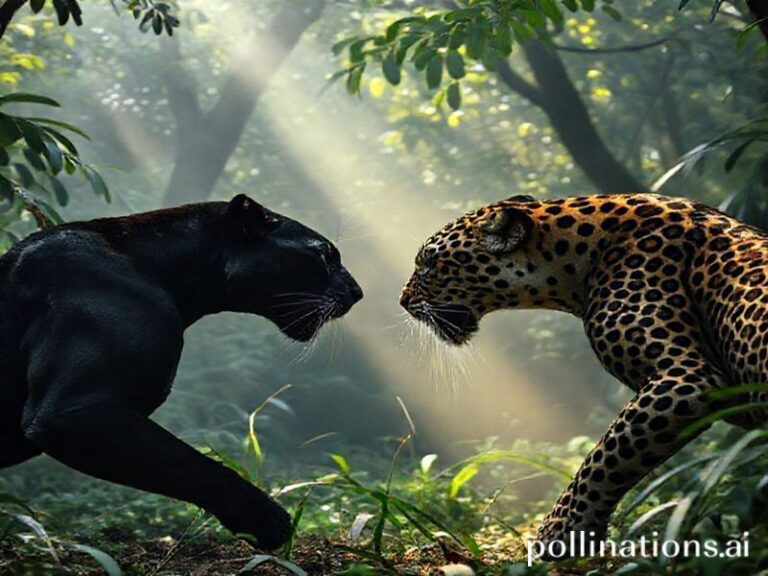Ore Oduba: The Glitter-Smeared Canary Singing in the World’s Coal Mine
Ore Oduba: How A British TV Host Became The Canary In Our Global Celebrity Coal Mine
By Our Man in a Mid-Cost Airline Lounge, Somewhere Over the Persian Gulf
There are, by last IMF count, roughly 7.9 billion humans currently failing to save for retirement. Of these, only one is named Ore Oduba—an accident of nomenclature that already sounds like a premium mineral water marketed exclusively in duty-free shops. Yet the man has somehow become a trans-continental Rorschach test: Nigerians claim him as proof of diaspora success, the BBC files him under “miscellaneous cheerful,” and American Netflix executives quietly tag him “the British guy we’ll call when we reboot Dancing with the Stars—Kabul Edition.”
Oduba’s origin story reads like a parody of post-colonial ambition: born in London to Nigerian parents, educated at boarding schools where lacrosse is a verb, then funneled straight into the BBC’s sausage grinder of precocious continuity announcers. While European banks were still laundering Russian oligarch money, Ore was perfecting the three-quarter smile that says, “I’m thrilled to introduce a segment about artisanal cheese, yet I also know the world is ending.” That smile would later win him Strictly Come Dancing in 2016, a victory that mattered more to Britain’s export statistics than to anyone who actually pays the TV license fee.
Now pause for global context. In 2024, a dancing newsreader is no longer quaint; he’s geopolitical chaff. When Ore pirouetted into the West End to play the Emcee in Cabaret, ticket sales spiked from Seoul to São Paulo, proving that the planet’s leisure class will gladly shell out £120 to watch a man in eyeliner warn them about fascism—preferably with jazz hands. The production’s marketing hashtag, #OreWillkommen, trended for 11 minutes, roughly the attention span of a TikTok-addled hedge-fund intern deciding whether to short the yen.
Meanwhile, the broader significance: Oduba has become the poster child for what diplomats call “soft-power tumbleweed.” Britain, having voluntarily kneecapped its own economy, now exports two things: period dramas about sad aristocrats and Ore Oduba hosting Children in Need while wearing a sequined waistcoat that cost more than Moldova’s annual defense budget. The Commonwealth watches, nods politely, and quietly signs infrastructure deals with Beijing.
But let’s not be too arch. There is something almost touching—if you squint—about a second-generation immigrant cheerfully embodying the national broadcaster’s last-ditch attempt at relevance. While the actual newsroom is dismantled by hedge funds and angry men on YouTube, Ore gamely fronts Olympic coverage, radiating the kind of optimism that used to be manufactured in Detroit before the robots took over. Somewhere in Lagos, an auntie records his every appearance on a cracked Android phone, proof that the family’s British branch has “made it,” even if inflation back home means gala tickets now cost 400,000 naira and a kidney.
The cynical read, of course, is that Ore is just another high-gloss distraction in the end-times variety show. The Amazon burns, crypto markets implode, and here we are parsing the cultural semiotics of a man who once interviewed a corgi about Brexit. But perhaps that’s the point. In an era when every push notification is a potential war crime, the global middle class craves a harmless avatar—someone who can cha-cha through the apocalypse without spilling his drink. Ore Oduba, with his unthreatening teeth and encyclopedic knowledge of light entertainment, is that avatar: a human lava lamp for the streaming age.
Conclusion: Whether he’s fronting the BBC’s Platinum Jubilee coverage or cameoing as “British Presenter #2” in a Netflix rom-com set in a fictional Balkan republic, Oduba remains the perfect encapsulation of our planetary mood: anxious, caffeinated, determined to smile through whatever fresh hell the algorithm serves next. If civilization collapses, archaeologists will find his glitter-strewn footprints on every continent, a mute testament to the brief, giddy moment when we thought sequins might save us. They didn’t, obviously. But for 90 seconds at a time, they made the abyss look surprisingly well-lit.







